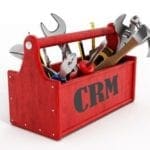The Dirty Data Domino Effect

The Data Quality Dilemma
Marketing and business development professionals spend a great deal of time carefully lining up plans to effectively communicate with key contacts. Like dominoes, we align our messages and target our audiences to achieve critical objectives; each communication, each invitation, each interaction carefully placed to reach the desired result.
But one thing can cause even the most effective marketing strategy to topple: bad data. Without clean, correct and complete data, our messages can fall flat, our interactions become ineffective and our results erode.
Big Bad Data
These days, we keep hearing a lot of buzz about big data, but what we really need isn’t more data – it’s better data. When you consider the rate at which we are adding data and the speed at which it degrades, the impact becomes compounded. By 2025 the International Data Corporation (IDC) estimates that worldwide data will grow 61% to 175 zettabytes. If you are curious about what a zettabyte may be, it’s 1,000,000,000,000,000,000,000. Yes, there are 21 zeros – meaning that’s a lot of data.
Another piece of the puzzle, additional research indicates that up to 30% of our key data degrades each year as people get hired, fired, promoted and change jobs; move and change addresses; get married and divorced; retire and even die. At the same time businesses are opening and closing; merging and being acquired; moving and relocating.
Without our constant attention, all this can add up to a huge pile of data that is missing or mistaken, duplicative or dated, incorrect or incomplete. Plus, each piece of data is often connected to many more pieces, so if just one is flawed, all of our marketing and business development plans can fall like, well, dominoes.
The Costs of Bad Data
All of this bad data can be quite costly. Respected researchers say that poor data quality may be costing an average organization as much as $14.2 million per year and that the annual U.S. economic cost of bad data may exceed $3 trillion. According to the Harvard Business Review, one reason that bad data costs so much is that decision makers, managers, knowledge workers, and others have to accommodate it in their work. Additionally, our staff may be wasting up to 50% of their time hunting for data, trying to confirm data they don’t trust and finding and correcting data errors. Bad data slows employees down, wastes their time and hinders their achievements, ultimately leading to poor performance, frustration and turnover.
As CRM and data quality consultants for professional services firms, we frequently hear frustration from firm leaders who say that their marketing teams can’t even pull together a “simple” list. To address this, let me suggest that anyone who thinks that quickly and easily pulling together a clean, complete and correct list of any sort in a professional services firm is “simple” has likely never worked in a professional services marketing department. In fact, there are a number of valid reasons that contact management can be challenging in this type of organization.
First, the contact management software and processes in professional services are built a bit backwards. In most organizations when a new employee joins, they are given access to an existing CRM database of contacts. But in a professional services firm, the CRM contacts actually come in from the professionals, with each partner providing their own personal contacts. Since many of these contacts may be known by others in the firm, duplicate contact creation becomes a real conundrum.
Plus, busy professionals don’t always have the time to pay adequate attention to their address books because of other responsibilities. And the way that some CRM systems are set up, this means that sometimes dirty records flowing in can corrupt clean CRM contacts.
Additionally, in a professional services firm, time is money – literally, so any process that puts a drain on time can also be a financial drain. Consider the inefficiency of having multiple or even hundreds of professionals who bill time at hundreds or upwards of $1000 an hour, regularly reviewing the same bad lists of combined firm contacts. Additionally, bad lists lead to bounces, and if a firm’s bounce rate on a campaign becomes high enough, email from the firm can get labeled as spam, causing the firm to be blacklisted by key companies. Some eMarketing providers are even known to block access if a firm’s bounce rate is too high.
These data issues can be a particularly painful problem in professional services where, probably more than any other industry, being able to communicate effectively with Clients and prospects is essential. Firms have to be able to share information from and about their professionals in order to successfully communicate, market and develop business. Plus, professionals spend a lot of their valuable (billable) time writing and speaking, and if their messages don’t reach the right audiences, all this time (and money) is wasted.
And professional services firms don’t just rely on data for communications and invitations. They also use it to determine the best ways to market their firms, identify opportunities for business development, advise pricing strategies, inform hiring decisions, decide where to open offices, determine which practices to invest in and, well, most everything. More critical yet, data is used for decision-making. This means that if your data is flawed, so are your decisions.
Bad data can also cause technology issues. If the professionals don’t trust the data, by default, they often won’t trust – or use – the technology. And while bad data is problematic enough on its own, consider what happens when we throw in (literally) multiple data sets by integrating other software or systems. A number of well-intentioned firms have executed well-thought-out CRM integration strategies only to later find that the data in the other systems were in worse shape than the data in the CRM.
– At CLIENTSFirst, our team of almost 100 consultants and data quality professionals has spent more than a decade helping hundreds of professional services firms assess and address their data quality challenges. If you need help with strategies for winning the data quality domino game, feel free to contact us at 404-249-9914 or Info@CLIENTSFirstConsulting.com. We have helped hundreds of organizations improve data quality, and we are always happy to share information, ideas and best practices for success.







